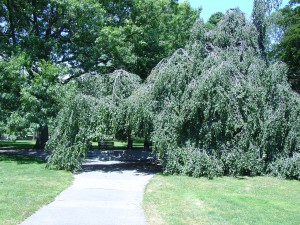European Beech (Fagus sylvatica) is native to the cool temperate regions of Europe. In the U.S. it is more at home in the Northeast, Upper Midwest, and Northwest regions (USDA Hardiness Zones 4 to 7) where summers are cool. European beech grows in full sun and moist, well-drained soils, ranging from mildly acidic to low basic. The tree suffers in the Southeastern U.S. heat and waterlogged clay soils.
Because of its large size and slow growth rate, European beech needs a few years to adapt to its planting site. Utilize this large specimen shade tree in public parks, golf courses, commercial properties and estates. European Beech grows 50 to 60 feet high and 40 feet wide with a dense, upright, oval form. It grows 10-20 % smaller than American beech (F. grandifolia) and its trunk bark is a darker gray.
European beech is a long lived. Trees planted by Thomas Jefferson at Monticello in 1807 survived almost 150 years. Very little vegetation grows under its dense tree canopy which carpets and shades the ground beneath with leaf mulch. Livestock, wildlife, and humans snack on beechnuts.
Leaves are dark green in summer and turn a stunning russet brown in the autumn. Two to three year old established trees can tolerate short 1-2 week long drought spells. Purple leaved cultivars tend to be less summer heat tolerant.
European beech responds well to heavy pruning and several together are grown as a tall hedge in Europe. Foliage and twigs are not tolerant of salt, including de-icing salts used on roadways.
European beech lists over 30 cultivars which includes these popular six:
- ‘Asplenifolia’- fern-like or cutleaf foliage.
- ‘Atropunicea’ (Copper beech) – spring/early summer purple leaves.
- ‘Dawyck’, aka ‘Fastigiata’ – narrow, upright branching habit.
- ‘Pendula’- weeping habit.
- ‘Riversii’- dark purple leaves.
- ‘Roseomarginata’ (Tricolor beech) – with green and white leaves with pink margins.


 Posted in
Posted in 
